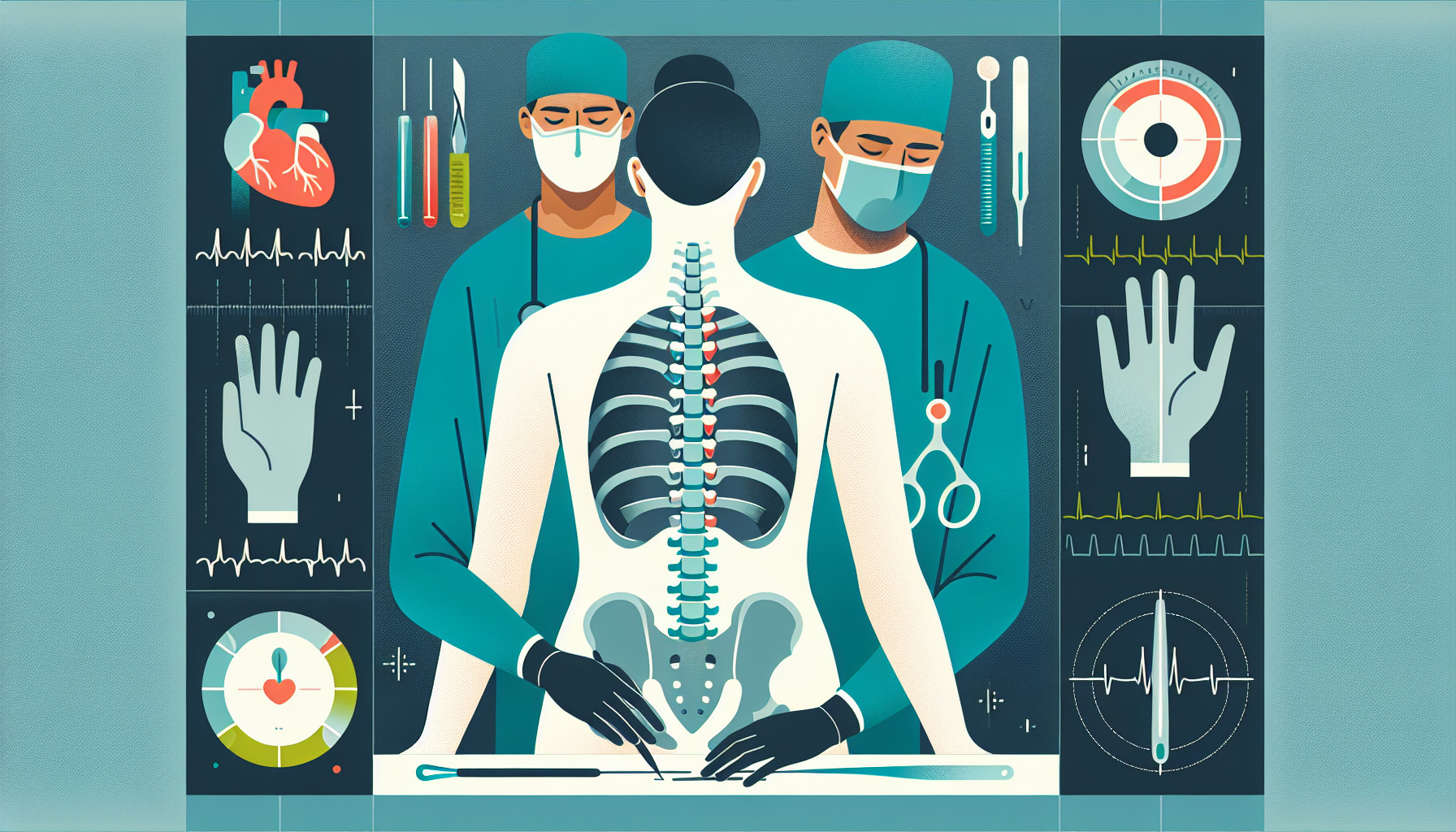Our Summary
This research study evaluates a surgical method known as ALIF (Anterior Lumbar Interbody Fusion) in patients who have had previous spine surgeries and are suffering from a condition called sagittal malalignment, which is a misalignment of the spine.
The researchers studied 12 patients who underwent this ALIF procedure. They measured things like the patients’ demographics, any other health conditions they had, what kind of surgical strategy was used, and the outcomes of the surgery, including any complications that occurred during or after the procedure.
The results showed that patients experienced less pain and disability after the surgery. The procedure was successful in realigning the spine in all cases. However, there were some complications, including a lesion that required suturing during surgery, two cases of nerve root irritation after surgery, and one wound infection that required further surgical cleaning and antibiotics.
The study concludes that using ALIF to correct spinal misalignment in patients who have already had spinal surgeries is possible and can be successful. This technique is robust enough to overcome the resistance of prior surgical implants and bone fusion, which means it can be done in a single surgery. However, like any surgical procedure, there are potential complications that need to be considered.
FAQs
- What is the Anterior Lumbar Interbody Fusion (ALIF) procedure and who is suitable for it?
- What were the results of the research study on the ALIF procedure and its effectiveness in treating spinal misalignment?
- What were the complications experienced by patients during or after the ALIF procedure?
Doctor’s Tip
A helpful tip that a doctor might tell a patient about lumbar fusion is to make sure to follow post-operative instructions carefully, including proper wound care, physical therapy exercises, and avoiding heavy lifting or strenuous activities that could strain the surgical site. It is important to attend all follow-up appointments with the surgeon to monitor healing progress and address any concerns or complications that may arise. Additionally, maintaining a healthy lifestyle with regular exercise and a balanced diet can help support the healing process and overall spine health.
Suitable For
Patients who are typically recommended lumbar fusion are those who have:
Degenerative disc disease: This condition occurs when the discs between the vertebrae in the spine break down, leading to pain, stiffness, and decreased mobility.
Spinal stenosis: This is a condition in which the spinal canal narrows, putting pressure on the spinal cord and nerves, leading to pain, numbness, and weakness in the legs.
Spondylolisthesis: This is a condition in which a vertebra slips out of place and onto the vertebra below it, causing pain and nerve compression.
Herniated disc: When the soft inner core of a disc in the spine pushes through the outer layer, it can cause pain and nerve compression.
Traumatic injury: Patients who have suffered a traumatic injury to the spine, such as a fracture, may require lumbar fusion to stabilize the spine and prevent further damage.
Failed back surgery syndrome: Patients who have had previous spine surgeries that have not been successful in relieving their symptoms may be recommended for lumbar fusion to address any remaining issues.
Overall, patients who have persistent back pain, weakness, numbness, or other symptoms that have not improved with conservative treatments such as physical therapy, medications, or injections may be candidates for lumbar fusion surgery. It is important for patients to discuss their symptoms and treatment options with a spine specialist to determine if lumbar fusion is the right choice for them.
Timeline
In summary, before lumbar fusion surgery, a patient may experience chronic back pain, leg pain, numbness or weakness, difficulty standing or walking, and other symptoms related to spinal misalignment. The patient will undergo various diagnostic tests, consultations with specialists, and may try conservative treatments like physical therapy or medication.
After lumbar fusion surgery, the patient will likely experience some pain and discomfort in the immediate post-operative period. They will need to follow specific post-operative instructions, including restrictions on physical activity and lifting. Over the following weeks and months, the patient will gradually regain strength and mobility through physical therapy and rehabilitation. They should see a reduction in their symptoms and an improvement in their overall quality of life. However, as with any surgery, there is a risk of complications that may require further treatment or intervention. Regular follow-up appointments with the surgeon are essential to monitor the healing process and address any concerns that may arise.
What to Ask Your Doctor
Some questions a patient should ask their doctor about lumbar fusion, specifically ALIF for sagittal malalignment, include:
- What is the success rate of ALIF for correcting spinal misalignment in patients who have had previous spine surgeries?
- What are the potential complications or risks associated with ALIF for sagittal malalignment?
- How long is the recovery process after undergoing ALIF surgery?
- Will I need physical therapy or rehabilitation after the surgery?
- Are there any specific lifestyle changes or precautions I should take after undergoing ALIF surgery?
- What is the likelihood of needing additional surgeries in the future after undergoing ALIF for sagittal malalignment?
- How soon can I expect to see improvements in my pain and mobility after the surgery?
- Are there any alternative treatment options to consider before deciding on ALIF surgery?
- What is the long-term outlook for patients who undergo ALIF for sagittal malalignment?
- How experienced are you in performing ALIF surgeries for patients with spinal misalignment?
Reference
Authors: Berjano P, Zanirato A, Langella F, Redaelli A, Martini C, Formica M, Lamartina C. Journal: Eur Spine J. 2021 Aug;30(8):2323-2332. doi: 10.1007/s00586-021-06888-z. Epub 2021 Jun 3. PMID: 34081185
